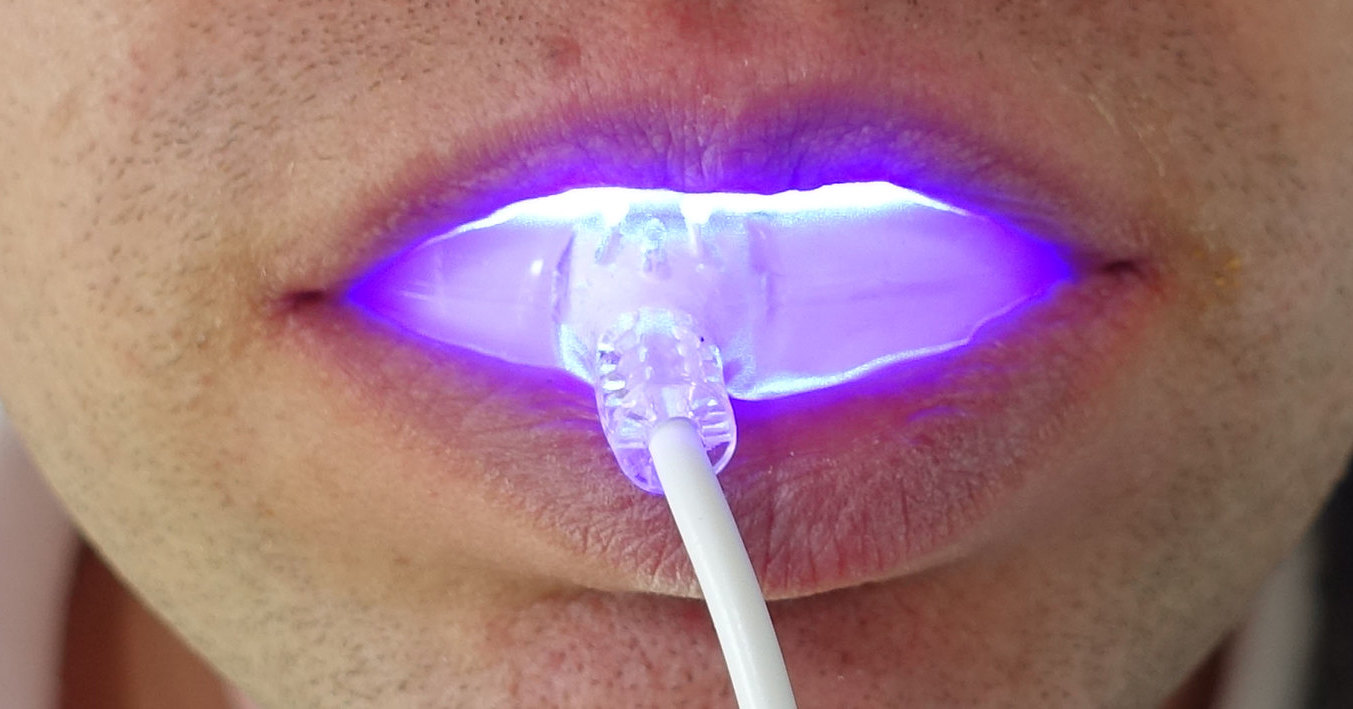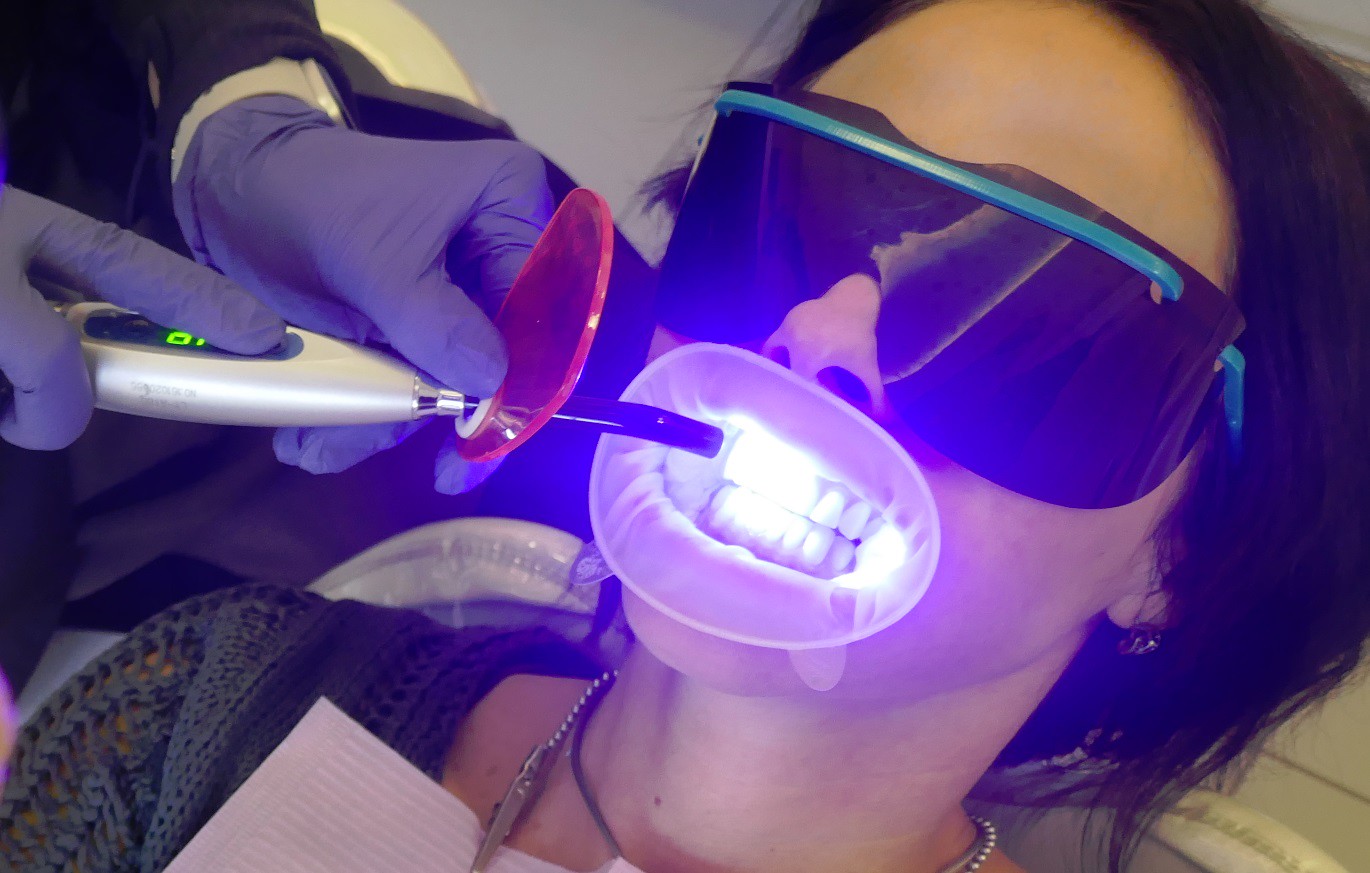The search for whiter teeth is a common one. Whitening products and procedures are a multi-billion-dollar industry. There are several options on the market to choose from, both do-it-yourself products and those applied in a professional setting.
The cost, safety, and results can vary widely depending on where you get your teeth whitened. Before choosing the product—and place—to brighten your smile, be sure to understand the pros and cons of each.
How Teeth Whitening Works—and Why it Sometimes Does Not
Most teeth whitening uses either carbamide peroxide or hydrogen peroxide solutions. These chemicals break down stains and lift them from tooth enamel. It is worth noting that while peroxide solutions work on natural tooth enamel, they will not change the color of dental reconstructions such as veneers, bonding, or crowns.
The strength of the whitening solution (the percentage of peroxide used) is one factor that impacts the success of a teeth whitening product or procedure. The more powerful the chemicals used, the faster and more complete the brightening will be.
The other factor is the type of stain. Teeth stains are either intrinsic or extrinsic. Intrinsic stains have internal causes that change the makeup of the tooth at a deep level. Heredity, aging, cavities, too much fluoride, and some medications can cause discoloration that may be impossible to remove.
Extrinsic stains, on the other hand, come from external sources that may be avoidable. Smoking, drinks like coffee or wine, and certain foods are examples. These discolor the teeth at the surface and are typically easier to lighten or erase.
A dentist can help determine the type of staining on teeth, and what methods or products might work best. They can also make sure that teeth and gums are healthy enough to withstand strong whitening chemicals. Since tooth decay or gum disease might make whitening painful or cause sensitivity, a dental checkup is a smart first step, even if a patient plans to whiten at home.
Over-the-Counter Teeth Whitening Products

Drugstores and online marketplaces carry a wide array of whitening products for at-home use. These come in the form of:
- Toothpaste
- Mouthwash and rinses
- Pens or brush-on solutions
- Gel strips
- Trays
Some of these products also come with an LED blue light meant to accelerate the process.
Convenience and cost make over-the-counter whitening a popular choice. Products are available from numerous locations without a dental visit. They fit just about any budget, with toothpaste as low as $5 or $6, or a full kit including trays and a blue light for less than $100.
Store-bought whitening products contain a fairly low concentration of peroxide—roughly 3% to 20%. This makes them safe for home use, but it also means they may not be strong enough for stubborn stains. There’s also a risk of overuse, which could cause pain or sensitivity, or lighten teeth beyond what looks natural.
All of these items are heavily marketed, so it can be difficult to know which are best. Purchasers can only rely on product reviews or trial and error to find what will give them the desired results. As for safety, in addition to a dentist’s recommendation, a good place to visit is the American Dental Association website for a list of products that have earned their seal of approval.
Teeth Whitening at the Dentist
Teeth whitening done by a dentist is at the opposite end of the price spectrum from over-the-counter options. It costs roughly $500 to $1000. The higher cost, however, could mean a safer and more successful experience.
The first thing a dentist will do is perform a thorough dental checkup. It will find any problems like cavities, and arrange to fix them before the whitening treatment begins. Once they see the stains, they can determine how best to treat them. For stains that aren’t removable, they can discuss other options such as veneers or bonding, which cover the teeth with a man-made material.
Because they are professionals, dentists have access to stronger chemicals that can do a better job on stains in less time. They may choose brands like Zoom! or laser teeth whitening, which are some of the most powerful tools available.
During the whitening procedure, dentists take precautions to avoid the peroxide coming into contact with the gums. The length of time the chemicals remain on the teeth is precisely timed too. These measures ensure that teeth whitening happens in the safest way possible.
A typical whitening session includes preparing the gums, and two rounds of application of the chemicals and rinsing it off. Under the dentist’s supervision, it will be clear how many more sessions might be needed to get the desired results—something that’s not always obvious when a patient whitens their own teeth.
Do You Need a Cosmetic Dentist?

The main difference between a cosmetic dentist and a general dentist is that the cosmetic dentist has chosen to specialize in aesthetic dentistry issues—meaning things that make a smile look its best. That does not mean that a cosmetic dentist won’t do a regular checkup or fill a cavity. But in addition to the usual dental school curriculum, they have taken additional courses and seminars in things like teeth whitening, veneers, bonding, and Invisalign.
It is not necessary to see a cosmetic dentist for teeth whitening. Many general dentists use the same process and products and are just as skilled at providing the treatment. If the patient already has a dentist they’re happy with, it might make sense to stay with them for teeth whitening. Those without a dentist can use our online tool to find local general and cosmetic dentists who offer whitening and start the process of making an appointment.
Teeth Whitening at a Salon or Spa
Teeth whitening has begun to pop up at day spas, salons, and even mall kiosks and tanning salons. As a cosmetic offering, it does seem to fit in with other services in this retail space, along with brow waxing, hair styling, and so on. But while the people administering teeth whitening products may be licensed estheticians, they are not dental professionals. Customers should be cautious about who is performing the procedure.
At a salon or spa, there is no guarantee that the person administering teeth whitening has received adequate training. Even if they have some training to administer the technique, they are not dentists or dental hygienists. Unlike at the dentist’s office, there is no dental exam before beginning, so there is a danger of applying strong chemicals to damaged teeth or gums. Also, a dentist will use only products certified by the American Dental Association. The same may not be true of a spa.
In some states, it is illegal for anyone who is not a dental professional to whiten teeth. In other states, non-dentists can get around the law by not touching the customer. They hand the whitening trays to them and the customer applies those trays themselves. The salon worker then must carefully move the light across their mouths without coming into direct contact.
While the lower price offered at some of these retail outlets might be tempting, the chance of an unsafe and possibly illegal environment is concerning. Patients should understand the risks before getting teeth whitening at a salon or anywhere other than a dentist’s office.
See a Dentist for Teeth Whitening Advice
Deciding where to get teeth whitening will depend on the cost, convenience, and risk factors. We suggest making an appointment to discuss it with a dental professional before making a decision. You’ll get the advice you need to confidently choose the best route to a brighter smile.


